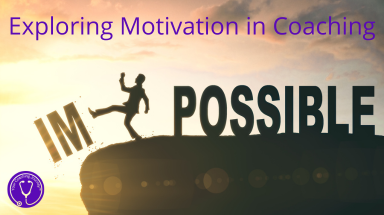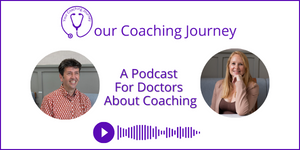Prefer to listen?
This blog post forms the basis of a podcast on our new coaching model, which you can listen to here.
Have you ever said you’d do something and then either started it and not continued and seen it through or just not had the motivation to start it at all.
We’ve both had coaching clients occasionally who have said they wanted to do something, identified the steps that they needed to take, and then not followed through.
Some of the key elements that have been show in research to increase the likelihood of maintaining motivation towards a goal are:
- intrinsic goals,
- harmonious goals,
- approach orientated goals,
- self concordant goals
Pursuing these types of goals is also thought to increase our happiness.
Intrinsically Motivated Goals:
These are goals where the motivation comes from within us. We really want to do something, explore something, become something. Whereas extrinsic goal or motivation is something that comes from outside of us: a manager setting a task, a partner making a suggestion, or perhaps our society, parents, or culture are influencing our own expectations of ourselves and our goals.
Some things will require some extrinsic motivation, for example, being paid for certain types of work. Or we might be personally motivated by extrinsic factors like money, because of something that we need or want to do with that money. So the extrinsic factors can be used to find and latch on to, something intrinsic that we want to fulfil. This is particularly important when it comes to more challenging goals or life changes.
Self-Concordant Objectives:
These are goals that match our values, they resonate with the type of person that we are and how we want to live our life. The more concordant they are with us as a person, the more motivation we will have for them.
Approach-Orientated Goals:
Research suggests that we’re more motivated if we are moving towards something- Rather than away. As opposed to moving away from it. For example: we are not eating chocolate because we want to feel healthier, it would be more motivating than not eating chocolate because we wanted to lose weight.
Alan Deutschman wrote a book called Change or Die that looked at research that was done with coronary artery bypass surgery patients in the U.S. It’s quite old research now, but interesting, nonetheless. The patients were told that if they didn’t change the way they were living within two years, they’d be dead. That was the stark message. Change or die. You’d think that would motivate people. Two years later, 90% of those in the study hadn’t changed the way they were living. So people go into a state of denial, ‘oh, it’s fine. It won’t happen to me. I’ll be one of the 10 %’. It’s too tough a message. Whereas, if you focus on, what happens if you change your lifestyle, for example, you could live another 20 years and you can enjoy life and be healthy and enjoy running around with your grandchildren. People are very much more motivated.
‘Away from’ motivation can work. For example, if you’re in a toxic environment at work, you might well be motivated to leave and find another job. But plenty of people stay, and it’s often not until a new opportunity arises that they escape.
Quite often it takes a big life event, like an illness, for people to say, ‘Hang on a minute, what am I doing?’. And again, it’s much easier for people to move towards something positive. If they’re offered a new job in a better environment, then that’s a much easier move to make, rather than moving away from something.
Harmonious Outcomes and Objectives:
This means that in relation to other goals and objectives we have in your life, there’s no conflict. For example, if someone had an intention of having a better work-life balance, but then they wanted to set a goal to earn more money, there could be a question about whether these two would be in conflict with each other.
A harmonious example would be, a desire to live a healthy live, and goal of giving up chocolate. They work well together.
The less harmonious the goals are, the more our motivation is impacted.
This is something that comes up a lot in coaching. It creates an ambivalence or cognitive dissonance of holding two competing ideas. They’re not sure what’s the right thing for them, or there is some sacrifice to be made by them pursuing one thing and giving up another.
Working with motivation in the coaching room
As a coach, it’s worth doing an ecology check around someone’s goals to make sure that they are fitting in with their life and that they’re not just going to destroy everything else in their life because they’re chasing one specific goal.
If someone is struggling with motivation, coaching can be really useful to explore their goal and objectives as well as their methods of achieving them in more detail. It may be that they can work through reframing their objective so that it feels more in line with these elements.
If someone comes to coaching with a goal that is extrinsic, perhaps, that someone else has given to them in some way, it’s worth exploring if it’s something that they do want to pursue because there’s some other intrinsic value to it. Then they can focus on the intrinsic value rather than the extrinsic pressure, making it more likely that they’ll pursue it.
Other Theories of Motivation
The author, Dan Pink writes about motivation, that there are three essential elements:
- Mastery,
- Autonomy,
- Purpose.
Purpose was a big intrinsic motivation. The why of your action. Having that understanding why it is that you are doing what you’re doing. If you’re in an organisation making widgets and you don’t know what the widgets are for, where’s the motivation to do that? Other than getting paid. If you know the widgets are going into the heart valve machinery, you might well have ‘I’m saving lives’ as your purpose behind the work.
These three elements are very similar, but a little bit different to one of the most recognised theories of motivation, certainly within positive psychology, called self-determination theory.
It’s actually classed as a meta-theory as it helps to frame other studies around motivation. It was put together and presented by Richard Ryan and Edward Desi and talks about the importance of intrinsic objectives and motivation, but also suggests that humans have three basic needs. When all of these needs are met, that provides the greatest opportunity for the greatest amount of motivation. The three needs are:
- Autonomy
- Competence
- Relatedness
This last one may appear to be unrelated, but it’s the idea that people have a need to belong and be connected with others and that each of us needs people.
Ryan and Deci suggest that when all of these three things are met within the pursuit of the objective that we have, that they show enhanced performance, persistence, and creativity. The other thing that self-determination theory showed, not just that these things contributed to more motivation, but that the degree to which they were unsupported or perhaps sabotaged or undermined within their social context, would actually have a detrimental impact on people’s wellbeing.
In this case, well-being is referring to the positive psychology definition of wellbeing, having a sense of satisfaction and feeling positive emotions. So, If we undermine those things, then undermines our motivation and our tenacity in that goal pursuit, but also our sense of wellbeing.
Being aware that other people, and being engaged in activities with other people can be really motivating for us. But being around the wrong people will really undermine those efforts. So sharing a goal with others, might be useful, if they’re going to be supportive. This may be another reason that someone chooses to have coaching to help them achieve a goal or objective and stay on track.
We are complex beings.
And now we come onto something that complicates things even further. We could have the intrinsic goal and all of the things that we’ve mentioned. It could be harmonious with the way that we want to live our life and our values etc. But if we haven’t got the right resources, that can be a big barrier to us.
Tony Robbins would say, when people complain of a lack of resources, don’t have the money, don’t have the people, don’t have the time, that what they’re really saying is they have a lack of resourcefulness.
However, if a mum who has kids got to do the school run, has a job, has to do the shopping, get them all eating healthily, etc., and has all of these things that she’s juggling, and is just exhausted. That means she has less inner resources to pursue the things that she wants to pursue. One of the first things always to consider is, is your motivation really a lack of motivation? Or do you just need a really good night’s sleep? Every night for the next week? Because that will impact us. That will impact our motivation. Part of our role as a coach is to explore that with them. So they find those inner resources, and they find their good night’s sleep and everything else.
It’s very complicated. Because we’re talking about physiological responses, cognitive responses, emotional responses, and then the interplay of all of that with all of the people and situations around us. So, no wonder some people find a lacking in motivation sometimes because that’s a lot to pull together.
And the motivation has to last over time. We have that initial activation, but we have to ask, what keeps us motivated to carry on working towards that desired outcome? That’s part of the coaching environment as well, how do we support people to maintain the change that they’ve initiated and want to see through to the end, whatever the end is. It could be a lifetime change.
That’s possibly where the solution-focused approach comes in, where we’ve got small steps, small goals, recognising those goals and achievements along the way, celebrating them in some way. But it’s those things we’ve just talked about, the cognitive, the emotional, all those psychological barriers that get in the way that stop people doing things where there’s often some more work to do in the coaching room.
People will say they want accountability, which we’ve talked about before. But actually, is it accountability or is it support? Is it space to continue to think about those actions, to come back and review those actions, and to fill up again on that motivation to keep going and be persistent? And there’s that relatedness element, that if you’re coming back to talk to someone about what you’ve been doing, then there’s other people involved. The coach could be the other person, even though they’re not doing it with you.
This topic isn’t always absolutely clear, there are lots of elements, some will work for one, bit not another, it’s a bit messy. People’s motivation is messy, and it’s going to be individual, and we’re going to have to work with each coachee on an individual basis to uncover what is going to motivate them.
This is a good point to add, if you’ve started something and never finished it, don’t beat yourself up. Because motivation is hard. Persistence on a long term objective is hard.
Going forward, coaching may well be useful, as will finding things that you really enjoy and really engage with, things that ar self-concordant, more authentic, and harmonious, will all help you to stay motivate, persistent and have positive wellbeing.
To find out more about our Doctors’ Transformational Coaching Diploma click through here



